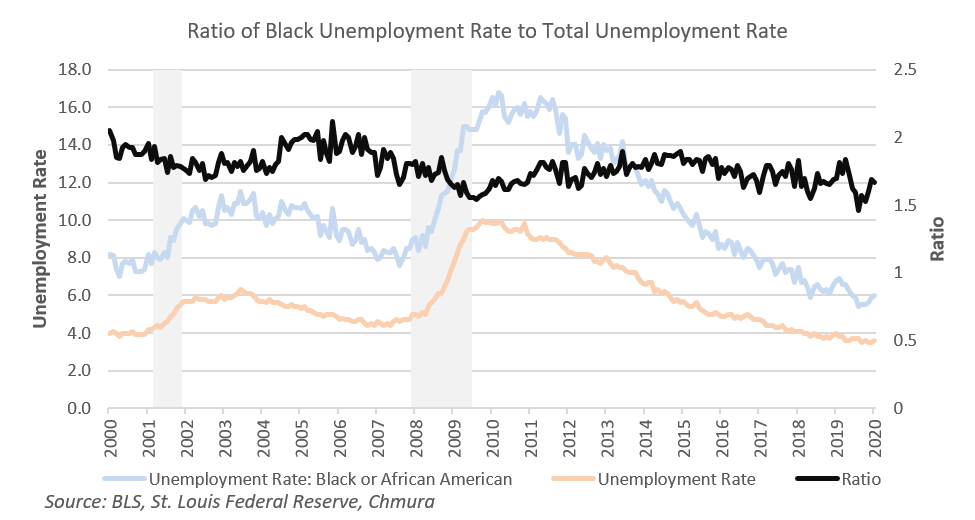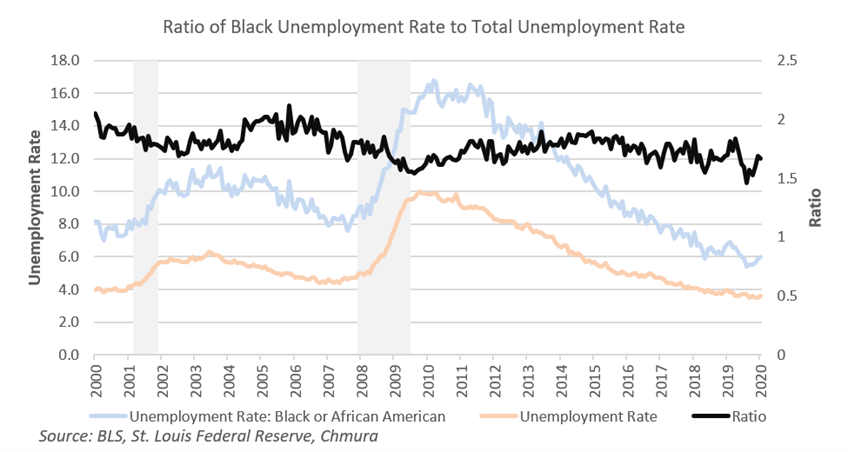Black Unemployment is Historically Low

The gap between black unemployment rates and the overall unemployment rate has been persistent; but as the nation continues its longest economic expansion on record, the black unemployment rate has dropped to new lows. As it gets harder for businesses to find workers to fill jobs, some are adopting new hiring practices, such as “ open hiring,” which may open up new opportunities for populations still struggling to find work. The unemployment rate can only go so low—it is possible that with continued economic growth, the gap may continue to decrease.
In August 2019, the black or African American unemployment rate fell to 5.4%--the lowest rate since the series was first recorded in 1972. That same month, the overall unemployment rate was 3.7%, or 1.7 percentage points lower.
Historically, the ratio of the black unemployment rate to the overall unemployment rate has been about 1.5 to 2 times higher. As of January 2020, the black unemployment rate is 6.0%, compared with 3.6% overall.
Though persistent, the gap has been closing in recent years. From 2000 to 2008, the ratio averaged 1.85 times higher. As unemployment rose sharply in the Great Recession and job losses were widespread, the ratio began to dip, averaging 1.59 times above the total unemployment rate in 2009. As the recovery picked up, the ratio inched upwards and leveled off, averaging 1.74 from 2010 through 2018. In 2019, as the overall unemployment rate continued to reach record lows and it has become more difficult for employers to fill jobs, the black unemployment rate was, on average, 1.65 times higher than the overall rate.

Why is there such a large and consistent difference in unemployment rates? Research is mixed but there are likely several factors at work.
Labor economics theory has established that the fundamental factor affecting labor market access is an individual’s human capital, typically embodied in a person’s education and experiences. Education levels can be used to explain much of the gap between the black and overall unemployment rates. For example, in 2018, 35% of the U.S. population over 25 years had bachelor’s or higher degree, while this percentage was only 25% for those identified as black alone. Higher education implies higher level of knowledge and skills, making an individual more appealing in the labor market.
Individual’s location matters as well. If a high concentration of black Americans live in states with slower economic growth, even if they perform similarly with other ethnic groups in those labor markets, there will be a gap in the unemployment rate when calculating the national average.[1]
As the longest economic expansion continues, the black unemployment rate has reached a historically low level. But the challenge still remains to shrink the unemployment gaps between black and other ethnic groups, and to expand opportunities for all.
Research support was provided by Melissa Pritchard.
[1] After accounting for differences in basic economic factors, if there still exists a persistent unemployment gap, we can seek other explanations. See, for example: https://www.federalreserve.gov/econres/feds/files/2017071pap.pdf
https://www.nber.org/papers/w20283.pdf
https://www.nber.org/papers/w22469.pdf
Subscribe to the Weekly Economic Update
Subscribe to the Weekly Economic Update and get news delivered straight to your inbox.












